

News in 2025
|
 FIG’s
strategic presence and community engagement at 15th session of the UN
Committee of Experts on Global Geospatial Information Management
(UN-GGIM)
FIG’s
strategic presence and community engagement at 15th session of the UN
Committee of Experts on Global Geospatial Information Management
(UN-GGIM)
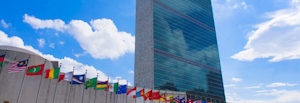 Report by FIG President Dr. Diane A. Dumashie from
the UN Headquarters, New York (pictured on the right)
Report by FIG President Dr. Diane A. Dumashie from
the UN Headquarters, New York (pictured on the right)
From 4 to 8 August 2025, FIG President Dr. Diane Dumashie participated in the 15th session of the United Nations Committee of Experts on Global Geospatial Information Management (UN GGIM), held at the United Nations Headquarters in New York. This pivotal annual gathering convened over 330 representatives, delegates, and observers from member states, international organizations, and civil society, reaffirming the global commitment to advancing geospatial information for sustainable development.
The UN Committee of Experts, a subsidiary body of the UN Economic and Social Council (ECOSOC), is tasked with guiding international cooperation on geospatial information, land administration, geography, and related domains. Its mandate is to strengthen the global geospatial ecosystem and ensure its continued relevance and benefit to all member states.
The session underscored the value of FIG’s engagement with the
UN-GGIM community. It is always striking to see so many of the FIG
community joining the relationship-dots between our professional
expertise and the wider nation state led UN GGIM community.
It was particularly inspiring to witness the convergence of FIG
professionals and national representatives who actively contribute to
both communities. Notable examples include Mikael Lilje, Sweden (FIG Honorary Member), Paula Dijkstra, the
Netherlands (FIG Chair, Agenda 2030 Task Force), as well as
nation states representatives from South Africa and
Norway, who, as members of local organising committees,
are contributing to upcoming FIG conferences in 2026 and 2027
respectively. Their dual roles enrich FIG’s global dialogue and amplify
the federation’s impact.
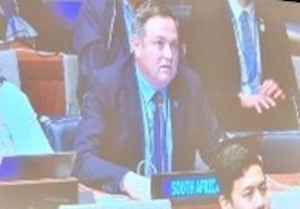
Clinton Heiman, Director General, South Africa
|
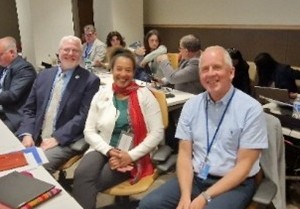
Kåre Kyrkjeeide,
Kartverket, Norway with FIG President Dr. Diane
Dumashie
|
Dialogue through impactful conversations is important. It is the most
basic social agreement to collaborate and cooperate. Crucially, the UN
Committee of Experts provides a forum for coordination and dialogue with
and among member states and relevant international organizations. FIG’s
recognized status as an UN-accredited non-governmental organization
enables it to participate meaningfully in UN GGIM deliberations. This
relationship is built on mutual respect, shared goals, and a commitment
to collaborative dialogue - an essential foundation for global
cooperation.
FIG’s conversations throughout the week were framed around providing:

The 15th session spanned over three days, focusing on a comprehensive
agenda, that has clear synergies with FIG four-year term work plan. The
UN Committee of Experts deliberated on its work items:
In addition:
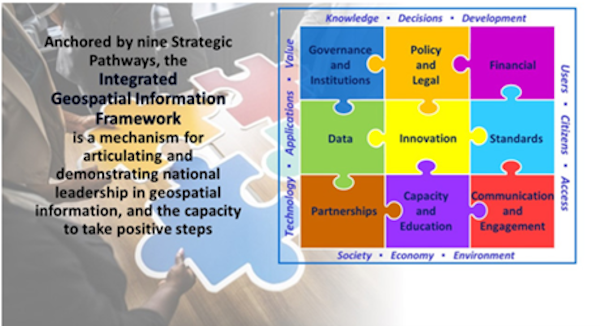
Schematic of the adopted the UN Integrated Geospatial Information Framework (IGIF)
The opportunity to hold impactful conversations is clear as this
agenda aligns very well to the FIG 4-year work plan and current
activities across FIG commissions, task forces and networks.
Over the course of the session, substantive agenda items were
deliberated by nation states. NGO observers, including FIG, are given
opportunities to contribute if time allows. FIG President Dr.
Diane Dumashie, Ryan Keenan (Chair,
FIG
Commission 5 and member of Sub Committee on Geodesy), and
Rosario Casanova (incoming Chair,
FIG
Commission 2), delivered
targeted interventions on the following agenda items:
These statements reflected FIG’s technical expertise and strategic
insights. For example the support given to the Netherlands' proposal for
a ‘Land Hub for Land Administration’ embedded into the emerging UN
Global Geospatial Ecosystem Centre of Excellence (UN-GGEC) based in
Riyadh, Saudi Arabia (see 2nd section below).
Special thanks are given to contributors from chairs who provided
content for FIG interventions, including Ryan Keenan, Paula
Dijkstra, Clarissa Augustinus, David Martin, Dan Roman, Rosario Casanova.
Along with thanks to all the hard work undertaken by FIG commissions,
individuals and FIG RCD networks chairs operating in the Asia
Pacific, Americas and African regions.
The importance of the two (soon to be three) UN-GGIM Centres of Excellence appears as a growing strength to the work of The UN Committee of Experts. These centres play a vital role in building global capacity, fostering innovation, and supporting the implementation of the UN-IGIF. FIG maintains strong relationships with these institutions, both through member contributions and collaborative knowledge exchange during FIG Working Weeks. Namely:
1. UN Global
Geodetic Centre of Excellence (UN-GGCE) in Bonn, Germany: Led by
Nick Brown, the UN-GGCE supports
the development of a globally coordinated geodetic infrastructure. Its
work is foundational to the GGRF and aligns with FIG’s geodetic
priorities. Mr. Brown notably presented at the
FIG Working Week 2024 in Accra,
Ghana.
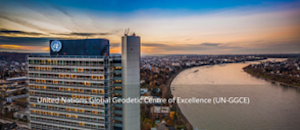
UN-GGIM Centres of Excellenc in Bonn, Germany
|
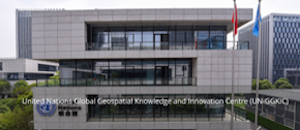
UN-GGIM Centres of Excellence in Deqing, China
|
2. UN Global Geospatial Knowledge and Innovation Centre (UN-GGKIC) in Deqing, China: Under the leadership of Dr. Li Pende, the centre focuses on expanding geospatial capacity and competence worldwide. It plays a central role in operationalizing of the United Nations Integrated Geospatial Information Framework (UN-IGIF). Dr. Li prominently featured the centre at Plenary of the FIG Working Week 2025 in Brisbane, Australia.
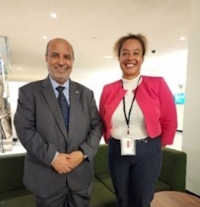 3.
The 3rd and emerging UN Global Geospatial Ecosystem Centre of Excellence
(UN-GGEC) in Riyadh, Saudi Arabia: H.E. Dr. Eng. Mohammed
Alsayel (President, General Authority for Survey and Geospatial
Information, Co-Chair UN-GGIM) discussed the focus of the UN-GGEC with
FIG President Dr. Diane Dumashie (picture on the right). To enhance the
global partnership toward the future environment for managing geospatial
information and aims to integrate geospatial data with digital
transformation technologies such as AI, digital twins, and IoT (Internet
of Things). Its mission is to shape a sustainable future geospatial
environment through innovation and strategic foresight.
3.
The 3rd and emerging UN Global Geospatial Ecosystem Centre of Excellence
(UN-GGEC) in Riyadh, Saudi Arabia: H.E. Dr. Eng. Mohammed
Alsayel (President, General Authority for Survey and Geospatial
Information, Co-Chair UN-GGIM) discussed the focus of the UN-GGEC with
FIG President Dr. Diane Dumashie (picture on the right). To enhance the
global partnership toward the future environment for managing geospatial
information and aims to integrate geospatial data with digital
transformation technologies such as AI, digital twins, and IoT (Internet
of Things). Its mission is to shape a sustainable future geospatial
environment through innovation and strategic foresight.
FIG’s engagement with these centres is both strategic and operational. FIG Vice President Professor Qin Yan and FIG Commission 5 Chair Ryan Keenan actively contribute respectively to UN-GGKIC and UN-GGCE, while Zaffar Mohamed-Ghouse (FIG Commission 8) and Abbas Rajabifard (Chair, FIG Geospatial Task Force) collaborate closely with the UN-GGEC.
The four UN-GGIM Thematic Networks exemplify the spirit of
collaboration across international organizations, including networks:
Geospatial Societies, United Nations System Network academia, and the
private sector.
FIG is a member of the UN-GGIM Geospatial Societies Network, a collation
of international recognised organisations involved in coordinating,
developing, managing and standardising geospatial information, as well
as other related matters.
This network operates under a rotating chairmanship, with FIG having
served from 2020 to 2022. Following the 15th session, the chair
transitioned to Prof. Dr. Shaik Mohamed Zaffar Sadiq Mohamed
Ghouse (ISDE),
succeeding Prof. Céline Rozenblat (IGU),
whose leadership over the past term was warmly acknowledged.
The network convenes formally during the annual UN-GGIM session and
seeks to engage informally throughout the year. It has the potential to
serve as a vital conduit for consensus-building and knowledge exchange
among geospatial societies. Further information on the on the network’s
activities and membership can be found on the FIG-hosted
UN-GGIM website.
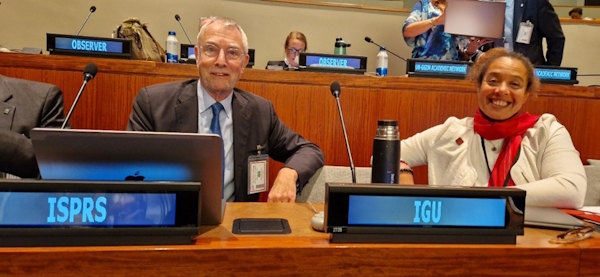
FIG’s participation in the 15th UN-GGIM session reaffirmed its
commitment to global cooperation, technical excellence, and inclusive
dialogue. FIG contributions through formal interventions, strategic
partnerships, and collaborative networks demonstrate its contribution to
shape the future of geospatial information management.
As the global community increasingly turns to data-driven solutions for
sustainable development, climate resilience, and digital transformation,
FIG remains a trusted partner and thought leader. The relationships
nurtured during this session, across member states, Centres of
Excellence, and geospatial societies will continue to inform and inspire
FIG’s work in the years ahead.
Dr. Dumashie’s presence at the UN Headquarters symbolized not only FIG’s
institutional engagement but also its enduring mission: to empower
professionals, foster innovation, and ensure that geospatial knowledge
serves the needs of all communities; leaving no one behind.
Click here for more information on the UN-GGIM 15th session August 2025.
The next and 16th annual session of the UN Committee of Experts will take place in New York August 2026. Meanwhile, the immediate next meetings are:
FIG members will be active participants in both.
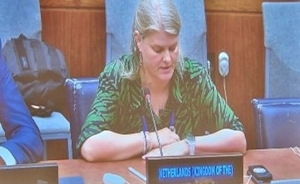
Paula Dijkstra, the Netherlands, FIG Chair of
Agenda 2030 Task Force
|
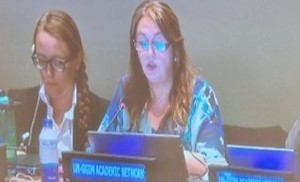
Rosario Casanova, Uruguay, incoming Chair of
FIG
Commission 2
|
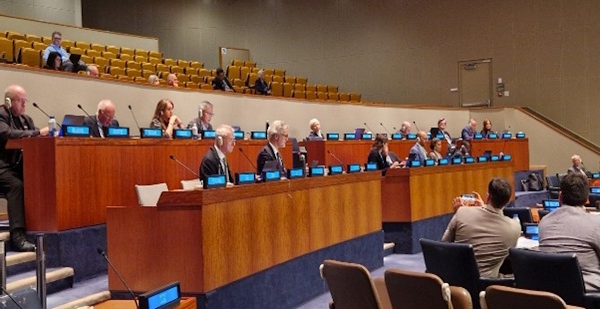
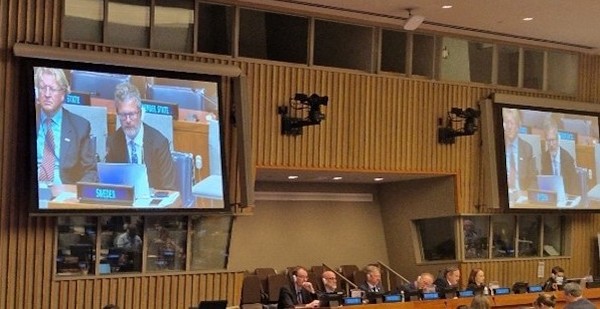
FIG President Dr. D. A. Dumashie, RICS (Royal Institution of Chartered
Surveyors)
Published
7 October 2025